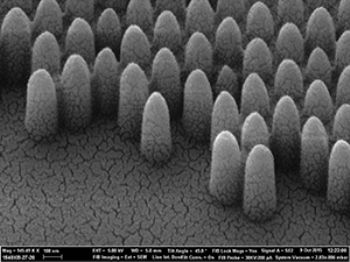
A new type of ‘smart’ window has been developed by University College London (
www.ucl.ac.uk) with support from the Engineering and Physical Sciences Research Council (EPSRC)(
www.epsrc.ac.uk).
It is said to be ultra-resistant to water, so rain forms spherical droplets that roll over the surface — picking up dirt, dust and other contaminants and carrying them away.
Project leader Ioannis Papakonstantinou said: “The conical design of nano-structures engraved on the glass traps air and ensures that only a tiny amount of water comes into contact with the surface.
“This is different from normal glass, where raindrops cling to the surface, slide down more slowly and leave marks behind.
“The glass is coated with a 5-10nm film of vanadium dioxide, which prevents heat loss during cold periods but also blocks infra-red radiation from the sun. The design of the nano-structures also gives the windows the same anti-reflective properties as the eyes of moths and other creatures that have evolved to hide from predators.”
The UCL team calculates that ‘smart’ windows could reduce heating bills by up to 40%, depending on the latitude of the building, and they could be especially well-suited to use in high-rise office buildings.
Dr Papakonstantinou added: “It’s currently estimated that, because of the obvious difficulties involved, the cost of cleaning a skyscraper’s windows in its first five years is the same as the original cost of installing them. Our glass could drastically cut this expenditure, quite apart from the appeal of lower energy bills.
“As the trend in architecture continues towards the inclusion of more glass, it’s vital that windows are as low-maintenance as possible. We also hope to develop a ‘smart’ film that incorporates our nano-structures and can be added to conventional domestic, office, factory and other windows on a DIY basis.”